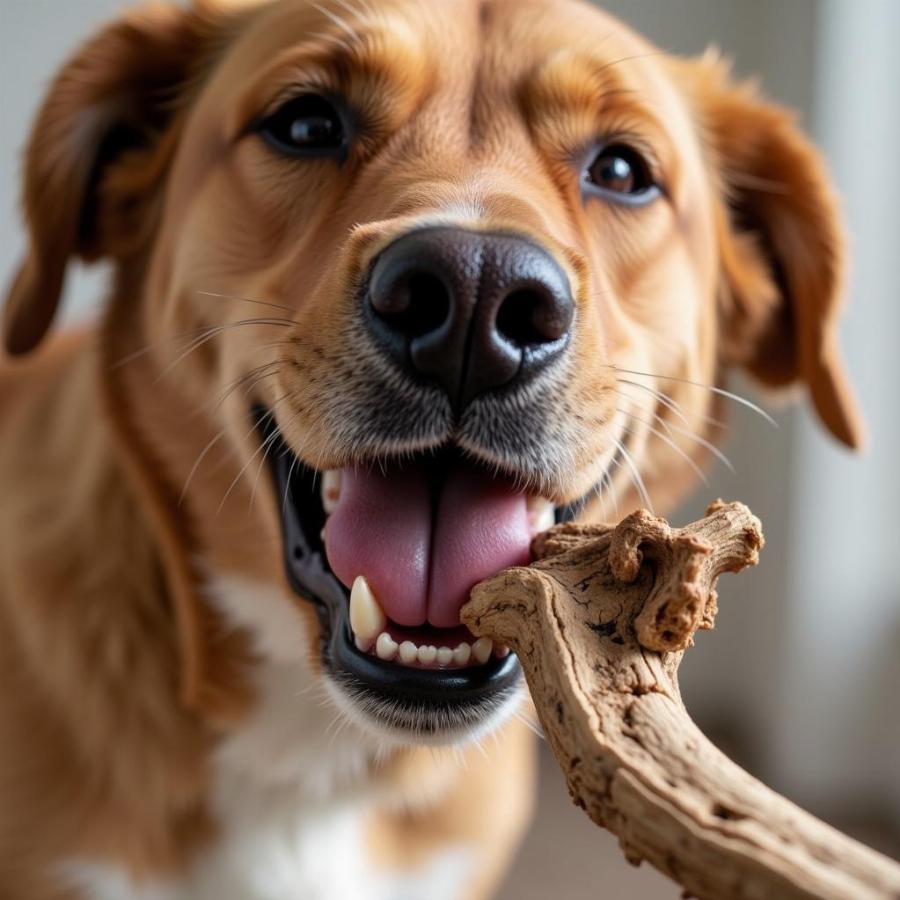Deer bones are a tempting find for many dog owners, especially those living in rural areas. However, the question of whether dogs can safely eat them is complex. While bones can offer some benefits like dental cleaning and mental stimulation, deer bones, in particular, present several significant risks. Understanding these risks is crucial to protecting your dog’s health.
The Risks of Deer Bones for Dogs
While the image of a dog happily gnawing on a bone seems natural, deer bones are not a safe treat. Their hardness makes them prone to splintering, which can lead to serious injuries in your dog’s mouth, throat, stomach, and intestines. These splinters can cause choking, internal bleeding, and painful blockages requiring expensive veterinary intervention.
Bacterial Contamination
Deer, like any wild animal, can carry bacteria and parasites. Bones left in the environment can become contaminated with harmful microorganisms like Salmonella and E. coli, which can cause serious illness in your dog. Even if the bone appears clean, the risk of bacterial contamination remains.
Bone Density and Splintering
Deer bones are dense and brittle, making them much more likely to splinter than cooked bones. These sharp splinters can cause a range of problems, from minor cuts in the mouth to life-threatening perforations of the digestive tract. Cooked bones, while generally softer, also pose splintering risks and should be avoided. Instead, consider safer alternatives like antler dog chew.
 Dog Chewing a Dangerous Deer Bone
Dog Chewing a Dangerous Deer Bone
Safer Alternatives to Deer Bones
Fortunately, there are plenty of safe and healthy alternatives to satisfy your dog’s chewing instincts. These alternatives offer the same benefits without the inherent risks of deer bones.
Commercially Available Chew Toys
Numerous chew toys are designed specifically for dogs, made from durable and non-toxic materials. These toys come in various shapes, sizes, and textures to cater to different breeds and chewing styles. For dogs who love a challenge, consider extreme kong dog toys, known for their durability and engaging designs.
Natural Chews
If you prefer a more natural approach, consider options like bully sticks, rawhide (under supervision), or collagen bones for dogs. These chews are digestible and offer a satisfying chewing experience. Always supervise your dog when they are chewing on any treat.
Why Are Deer Bones Particularly Dangerous?
Deer bones are particularly risky due to their exposure to the elements and potential contact with other animals. This increases the risk of bacterial contamination. Furthermore, the density of deer bones increases the likelihood of dangerous splintering.
Can Cooked Deer Bones Be Given to Dogs?
No, cooking deer bones does not eliminate the risk of splintering. In fact, it can make them even more brittle and dangerous. Even if the bone seems soft, it can still splinter into sharp shards that can harm your dog. For a safer option providing similar benefits, consider bone marrow bones for dogs from reputable sources.
What to Do if Your Dog Eats a Deer Bone
If your dog manages to eat a deer bone, monitor them closely for any signs of distress, such as vomiting, diarrhea, constipation, loss of appetite, or abdominal pain. If you notice any of these symptoms, contact your veterinarian immediately.
“Regularly inspecting your dog’s chew toys and discarding any damaged ones is crucial for their safety,” says Dr. Emily Carter, DVM, a veterinary specialist with over 15 years of experience. “Prevention is always better than cure when it comes to your dog’s health.”
Conclusion
While the temptation to let your dog enjoy a found deer bone might be strong, the risks significantly outweigh any potential benefits. The potential for splintering, bacterial contamination, and internal injuries makes deer bones a dangerous treat. Opt for safer alternatives like commercially available chew toys or natural chews like antlers or bully sticks to keep your dog happy and healthy. Always prioritize your dog’s safety by choosing appropriate chew treats and consulting with your veterinarian if you have any concerns. Remember, a little precaution can go a long way in ensuring your furry friend’s well-being. Are marrow bones safe for dogs? Click the link to learn more about are marrow bones safe for dogs.
FAQ
- What are the risks of feeding deer bones to my dog? Splintering, bacterial contamination, and internal injuries are the primary risks.
- What should I do if my dog eats a deer bone? Monitor them closely for any signs of distress and contact your veterinarian immediately if you notice any unusual symptoms.
- Are there safe alternatives to deer bones? Yes, commercially available chew toys and natural chews like bully sticks and antlers are safe alternatives.
- Can I cook deer bones to make them safe for my dog? No, cooking does not eliminate the risk of splintering.
- What are some signs of distress to watch for if my dog eats a deer bone? Vomiting, diarrhea, constipation, loss of appetite, and abdominal pain are common signs of distress.
- Where can I find safe chew toys for my dog? Pet stores, online retailers, and some veterinary clinics offer a wide variety of safe chew toys.
- How can I prevent my dog from eating deer bones in the first place? Supervise your dog outdoors and keep deer bones out of their reach.
Related Questions & Articles
- Are rawhide chews safe for dogs?
- How to choose the right chew toy for my dog’s size and breed?
- Dental care for dogs: Importance and tips
Beaut Dogs is your go-to resource for all things related to dog care. We provide reliable, helpful, and in-depth information on a wide range of topics, from breed-specific needs to health, training, and nutrition. When you need support, contact Email: [email protected] to receive detailed and accurate answers from Beaut Dogs. Visit us today at https://beautdogs.com to explore the wonderful world of dogs and learn how to best care for your canine companion.